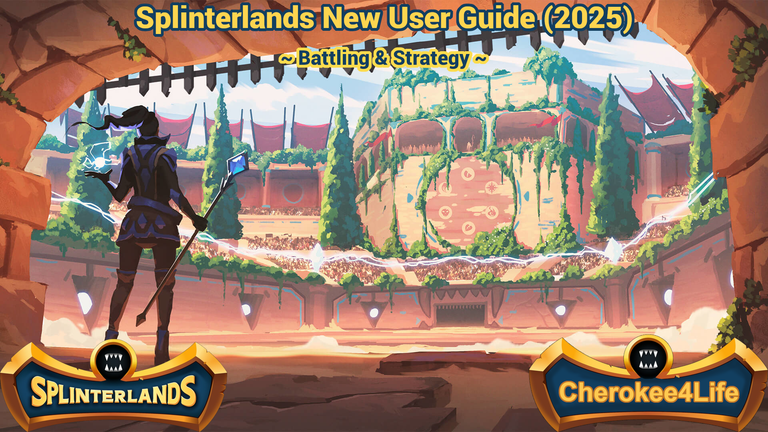Battling & Strategy | Splinterlands New User Guide (2025) | Article 2 of 7


Introduction
This is article #2 in the series. Today we are going to walk through Battles and what it all entails.

Links to All Articles (once published)
Article #1 - Just Getting Started
Article #2 - Battling & Strategy
Article #3 - Cards Cards Cards
Article #4 - All Currencies
Article #5 - Items
Article #6 - Guilds & Gladiators
Article #7 - Everything Else & More

Seasons
Splinterlands works around Seasons. A Season is a 14 day period. As soon as 1 season ends a new season will start.
So, if you want to play in the Wild League/Format then you are going to spend 2,000 DEC every 14 days. That is a BIG investment so new players.... do NOT do this for a LONG TIME.
Modern and Wild follow the same 2 week Season schedule.
You can see how much time is left in the season in the top left corner in the 'Play' menu.
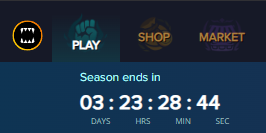
Why does it matter if you are just playing Modern anyways? Because of Season end rewards and League Rewards.
Throughout each Season as you battle you earn Battle rewards for every win. That will include SPS and Glint (more on both later). But let's say for example you win a Battle and you earn 50 Glint. You will get that Glint in your in-game wallet immediately. But another 50 Glint will be sent to your end of Season Rewards.
So at the end of the season that amount in your Season Rewards will be sent to your in-game wallet as well so you can spend. So at the end of each season people who battled will get a nice chunk of Glint to spend in-game.

Energy
Every time you battle it will cost 1 energy. You have a max energy of 50. You will regain energy at 1 per hour.
You will see your energy right underneath the Battle Button.
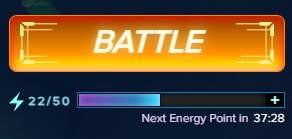
If you click on that ➕ sign it will bring you to a new page where you can buy energy if you want. You do NOT have to but can if you choose to.
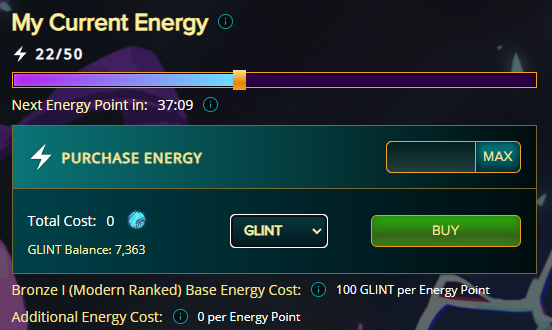
You can buy Energy with either, Glint / Dec / Dec-B / Credits. I would recommend only spending Glint on it IF you choose to buy energy.
The prices also increase as your progress up through the leagues.
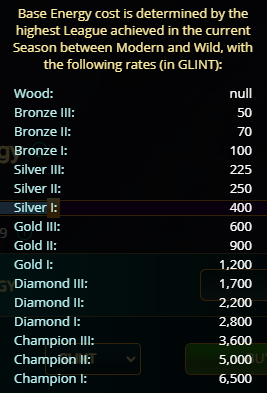
And if you buy 25 energy in 1 day, every Energy after that will cost 50%.

Rulesets (Modifiers)
Every game is going to be different and that is thanks in part to Rulesets. What is a ruleset? Well it is the rules that you have to follow during a specific battle. It could be that you can only summon melee units. It could be that all units get a special ability.
At the start of every battle it will list out which Ruleset/Modifiers are applicable to that battle.
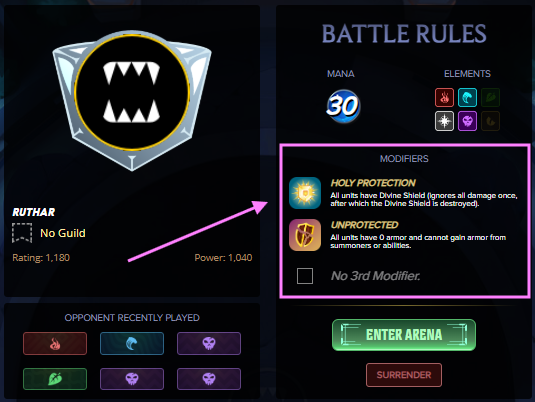
There are so many that it is hard to list them all. I know of 26 different Rulesets. You know what? Screw it. Here are the various rulesets and what they do.
| Image | Description | Image | Description |
|---|---|---|---|
 | Aimless: All units with magic and ranged attacks have Scattershot (magic and ranged attacks target a random enemy unit). |  | Aim True: All units gain True Strike (attacks will never miss). |
 | Are You Not Entertained: You can summon one additional gladiator. |  | Armored Up: All units gain +2 armor. |
 | Back to Basics: Units lose all abilities. |  | Beefcakes: You can only summon units with 5 or more health. |
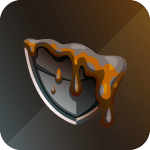 | Blood and Sunder: All units have Corrosive Ward (-2 to attacker’s armor and maximum armor when hit by a melee attack). |  | Born Again: All units have Rebirth (self-resurrects once per battle with 1 health and 100% of armor; all magic debuffs are removed, and all magic buffs are reapplied; skips turn). |
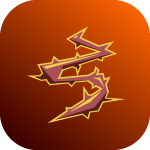 | Briar Patch: All units have Thorns (returns 2 damage to attacker when hit by a melee attack). | 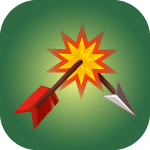 | Broken Arrows: You cannot summon units with ranged attacks. |
 | Close Range: All units have Close Range (can use ranged attacks from the first position). |  | CounterSpell: All units have Magic Reflect (returns 50% of magic damage to attacker, rounded up). |
 | Earthquake: All nonflying and snared units take 2 physical damage at the beginning of each round, starting round 2. |  | Equalizer: The initial health of all units is equal to that of the unit on either team with the highest base health |
 | Even Stevens: You can only summon units with even mana costs. |  | Explosive Weaponry: All units have Blast (deals an additional 50% damage to units adjacent to the target, rounded up). |
 | Ferocity: All units have Fury (deals double damage if the target has Taunt). |  | Fours a Crowd: You can summon a maximum of 4 units. |
 | Going the Distance: You can only summon units with ranged attacks. |  | Heavy Hitters: All units have Knock Out (deals double damage if the target is stunned). |
 | High Five: You can summon a maximum of 5 units. |  | Keep Your Distance: You cannot summon units with melee attacks. |
 | Little League: You can only summon units and summoners that cost 4 or less mana. |  | Lost Legendaries: You cannot summon legendary units. |
 | Lost Magic: You cannot summon units with magic attacks. |  | Maneuvers: All units have Reach (can use melee attacks from the second position). |
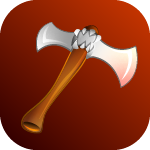 | Melee Mayhem: Units can use melee attacks from any position. |  | Might Makes Right: You can only summon units with 3 or more ranged, magic, or melee power. |
 | Need For Speed: You can only summon units with 3 or more speed. |  | Rise of the Commons: You can only summon rare and common units. |
 | Shades of Grey: Only Neutral units may be used. |  | Stampede: Trample (after using a melee attack to defeat a unit, performs another melee attack against the unit in the next position) can trigger multiple times if the trampled unit is destroyed. |
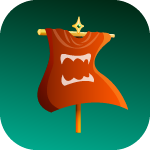 | Standard: No change to standard gameplay rules or mechanics. |  | Super Sneak: All melee units have Sneak (targets the enemy unit in the last position). |
 | Target Practice: All units with magic and ranged attacks have Snipe (magic and ranged attacks target the first non-melee enemy unit behind the first position). |  | Tis But Scratches: All units have Cripple (-1 to target’s max health after each successful attack; does not affect units with Immunity). |
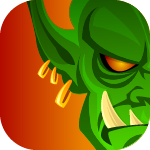 | Up Close and Personal: You can only summon units with melee attacks. |  | Up to Eleven: All units have Amplify (increases damage of Retaliate and all Punishment abilities—Corrosive Ward, Magic Reflect, Return Fire, and Thorns—by 1; does not stack). |
 | Weak Magic: Magic damage hits armor before reducing health. |  | What Doesn't Kill You: All units have Enrage (+50% melee power and speed if not at full health, rounded up). |
I am not going to lie, this section took way longer than I care to admit. I may have missed a Ruleset but honestly I don't think I did. If I did miss any though please comment which one and I will add it here.
*After multiple edits and updates to this post I found a few more Rulesets that I previously missed. If you want the official Spliterlands page detailing them you can check it out here.
 | Aimless: All units have Deflect (0 damage from Blast splash damage and Punishment abilities—Corrosive Ward, Magic Reflect, Return Fire, and Thorns). |  | Opportunity: All units have Opportunity (targets the enemy unit with the least health). |
|---|---|---|---|
 | Return Fire: All Units have Return Fire (returns 50% of ranged damage to attacker, rounded up). |  | Fog of War: Units lose Sneak, Snipe, and Opportunity. |
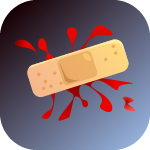 | Healed Out: Units and summoners lose all abilities that restore health. | 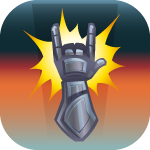 | Heavy Metal: You can only summon armored units. |
 | Holy Protection: All units have Divine Shield (ignores all damage once, after which the Divine Shield is destroyed). |  | Noxious Fumes: All units start the battle poisoned and lose 2 health at the beginning of each round, starting in round 2. |
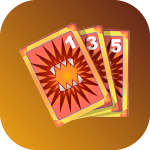 | Odd Ones Out: You can only summon units with odd mana costs. | Reverse Speed: Units with the lowest speed attack first and have the highest chance to evade attacks. |
Depending on the battle (Brawl vs Bronze League vs Wild/Modern, etc etc) you may have multiple Rulesets in play in 1 battle. Every Battle starts with a Ruleset and you have to then work from there.
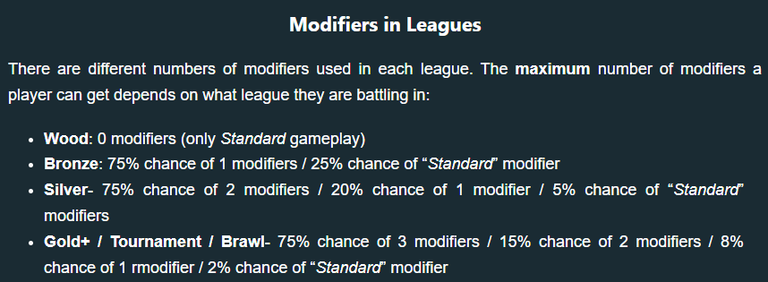
For example if the Ruleset for a battle is "Shades of Grey" then you will only be able to summon Neutral units so the Summoner you pick will play into not which element it is and what troops it can summon but what Abilities that Summoner can give to your units only.

Abilities
Abilities are sort of like Rulesets where they apply a specific.. well ability to a unit or units. There are many out there and way too many to list.
You can see some of them on the Official page here.
These 'Abilities' are on specific cards and always stay on the card (unless a Ruleset removes them as Rulesets will always supersede Abilities).
As an example let's take a look at the Aria Bandit unit card.
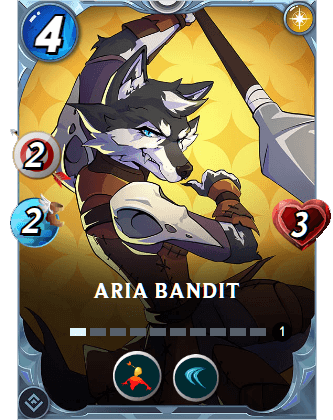
At the bottom center of the card you will see 2 icons. Those are his abilities.
On the left he has "Snipe".

And the one on the right is "Dodge".

So when you use this card in a battle he will have a 25% chance to dodge/evade any physical (melee) attack, and Magic and Range attacks will target the first unit in the lineup that is not a Melee unit.
Using these Abilities in conjunction with the Battles Ruleset is how you will win battles. Yes you need good cards to win but I have won battles against much stronger cards because I used the abilities to my advantage over my opponent.
Just so that you get the idea of just how many Abilities there are here is the most up to list that I could put together.
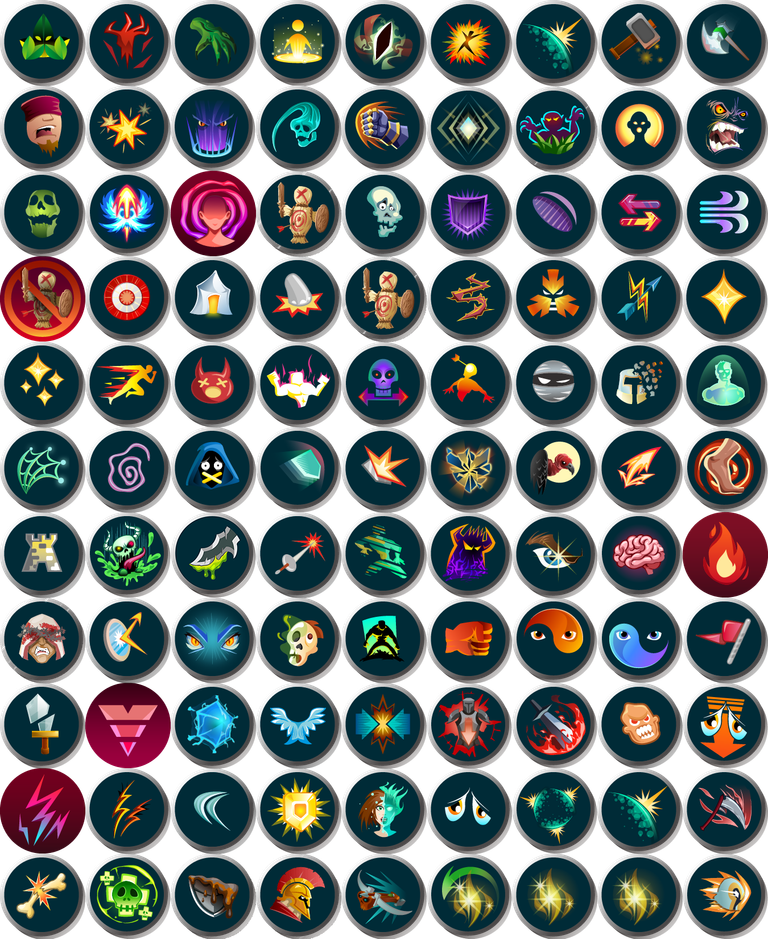
Yeah... there is a ALOT of different abilities.
When a Summoner has a ability on it that usually means it applies to all your Unit cards (unless specifically stated otherwise).

Mana
What is Mana? Well when you start a battle it will tell you the ruleset(s) but it will also tell you how much Mana you can use.
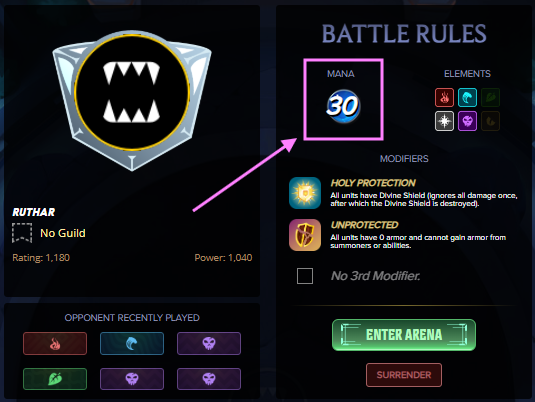
Every single card has a Mana number on it in the top left corner in a blue circle.
Going back to our Aria Bandit again, we can see that is costs 4 mana to use him.

Something to pay attention to is that Summoners costs Mana as well as well as the Unit cards. This is just another layer of strategy to use. Do you use a really powerful Summoner that costs 8 mana perhaps? Or do you use a 4 mana Summoner so you can use an extra 4 mana Unit card?
You can NEVER go over the mana limit but you can go under (I don't recommend it).

Summoners vs Units
Every Splinterlands card will be either a Summoner or a Unit card. That is a very distinct difference that you need to pay attention to.
When you join a battle you first have to pick what Summoner you want to use. Depending on the Summoner you pick and the RuleSet for that battle it will determine which Unit cards you can place with your Summoner.
The general rule of thumb is that for a Fire Summoner you can use Fire and Neutral Unit cards. For Earth Summoner, well Earth and Neutral Unit cards. etc etc.
This does get a little tricky with some summoners as they may allow you to use more than 1 element of Unit card. In the top right of each Summoner card it will show you which Elements of Unit cards you can utilze.
Let's take a look at Brewmaster Abraxas for example.
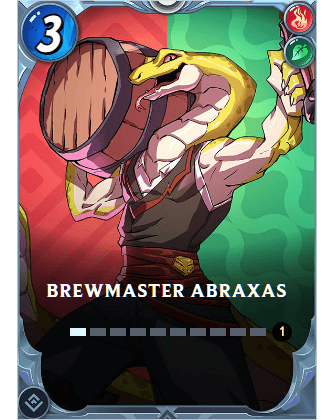
In the top right corner you will see a Fire Element and a Earth Element. That means this Summoner will allow you to play both Fire & Earth Unit cards as well as Neutral Units.
Pay attention to the Battle Rules as each battle will tell you which Elements are available to use.
At the start of every battle it will show you exactly what Elements can be used.
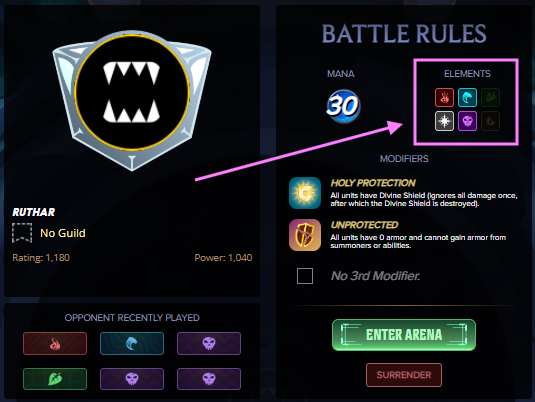

Strategy
There is so much strategy that could be talked about here. However, since this is focused on new players I highly recommend you just start playing battles because win or lose that experience will be the best for you.
One thing that you should pay attention to early on is your opponents previous battles. When you start a battle and find a opponent it will show you their previous 6 battles.
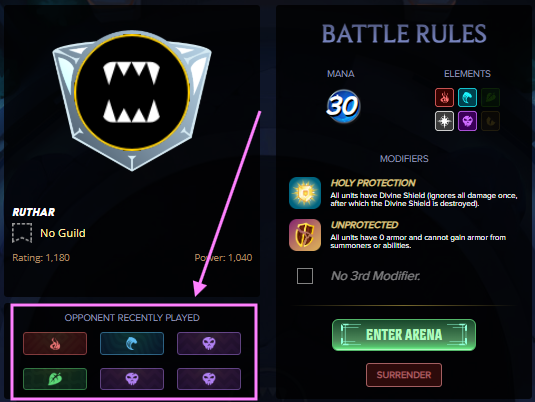
If you hover over one of the battles it will show you which Summoner and what units they used. This can be super helpful if you can see their last 4 battles they used Death cards with say cards that had the 'Thorns' ability. Maybe then you try to use more Range or Magic Units than Melee units.
There is also strategy that comes into play with what cards to acquire and focus on but we will get to that in another article.
In the next article we will go over Unit cards versus Summoner cards and strategy with using those abilities or like elements together.

How Battles work
At it's core if you just look at the core of the game. Splinterlands is a 6 card versus 6 card battle to the death. (obviously each battle has it's own rules and it may not be 6v6 every time but just go with me here).
You pick 1 Summoner card and then up to 6 Unit cards to fight the other teams 6 Unit cards. Whoever has the best strategy will win!
Here is what a battle can look like after both side picked their Summoners and Units.
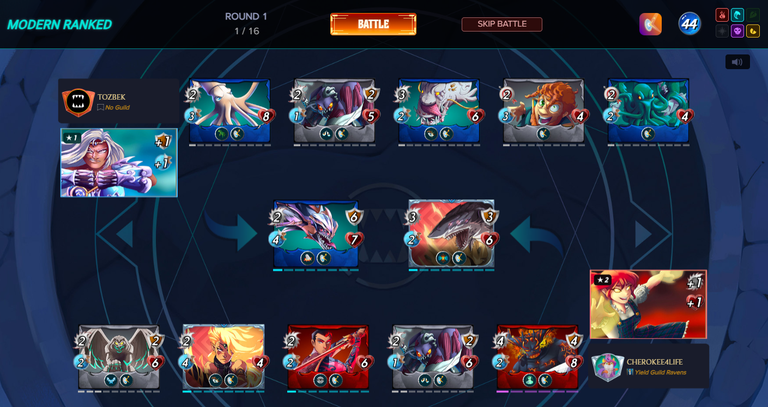
Cards with the highest Speed go first. Cards with the lowest speed go last. All Unit cards get to attack once and then that round is over and a new round starts and everything repeats. You want to outlast your opponent but having the fastest troops doesn't always mean you will win.

